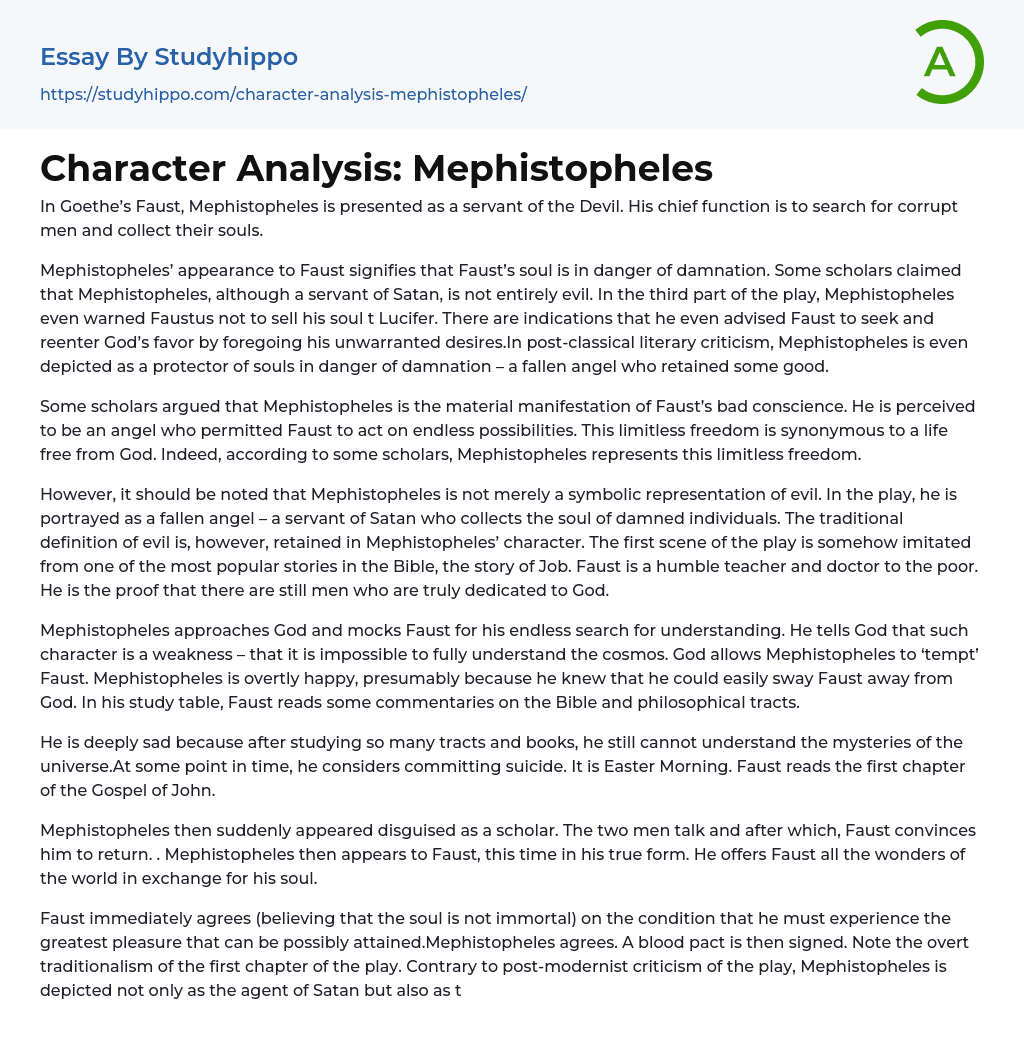In Goethe’s Faust, Mephistopheles is presented as a servant of the Devil. His chief function is to search for corrupt men and collect their souls.
Mephistopheles’ appearance to Faust signifies that Faust’s soul is in danger of damnation. Some scholars claimed that Mephistopheles, although a servant of Satan, is not entirely evil. In the third part of the play, Mephistopheles even warned Faustus not to sell his soul t Lucifer. There are indications that he even advised Faust to seek and reenter God’s favor by foregoing his unwarranted desires.In post-classical literary criticism, Mephistopheles is even depicted as a protector of souls in danger of damnation – a fallen angel who retained some good.
Some scholars argued that Mephistopheles is the material manifestation of Faust’s bad conscience. He is perceived to be an angel who pe
...rmitted Faust to act on endless possibilities. This limitless freedom is synonymous to a life free from God. Indeed, according to some scholars, Mephistopheles represents this limitless freedom.
However, it should be noted that Mephistopheles is not merely a symbolic representation of evil. In the play, he is portrayed as a fallen angel – a servant of Satan who collects the soul of damned individuals. The traditional definition of evil is, however, retained in Mephistopheles’ character. The first scene of the play is somehow imitated from one of the most popular stories in the Bible, the story of Job. Faust is a humble teacher and doctor to the poor. He is the proof that there are still men who are truly dedicated to God.
Mephistopheles approaches God and mocks Faust for his endless search for understanding. He tells God that such character i
a weakness – that it is impossible to fully understand the cosmos. God allows Mephistopheles to ‘tempt’ Faust. Mephistopheles is overtly happy, presumably because he knew that he could easily sway Faust away from God. In his study table, Faust reads some commentaries on the Bible and philosophical tracts.
He is deeply sad because after studying so many tracts and books, he still cannot understand the mysteries of the universe.At some point in time, he considers committing suicide. It is Easter Morning. Faust reads the first chapter of the Gospel of John.
Mephistopheles then suddenly appeared disguised as a scholar. The two men talk and after which, Faust convinces him to return. . Mephistopheles then appears to Faust, this time in his true form. He offers Faust all the wonders of the world in exchange for his soul.
Faust immediately agrees (believing that the soul is not immortal) on the condition that he must experience the greatest pleasure that can be possibly attained.Mephistopheles agrees. A blood pact is then signed. Note the overt traditionalism of the first chapter of the play. Contrary to post-modernist criticism of the play, Mephistopheles is depicted not only as the agent of Satan but also as the bearer of true evil.
His proud stature as a fallen angel is a proof that he is fully capable of swaying men away from God. Indeed, Mephistopheles is not only Faust’s bad conscience; he is an incarnate of evil – a creature whose existence is independent from that of either Faust or his conscience.
- First person essays
- Baptism essays
- Holy Spirit essays
- Jesus Christ essays
- Adam And Eve essays
- Crucifixion Of Jesus essays
- Crusades essays
- Eucharist essays
- God The Father essays
- Pope essays
- Protestantism essays
- Christian essays
- Church essays
- Elizabeth essays
- Sacrament essays
- Catholic Church essays
- Lord essays
- Priest essays
- Protestant Reformation essays
- Spirituality essays
- Angel essays
- American Literature essays
- Between The World and Me essays
- Book Report essays
- Book Review essays
- Book Summary essays
- Books essays
- Character essays
- Coming of Age essays
- Dante's Inferno essays
- Everyday Use essays
- Flowers for Algernon essays
- Genre essays
- Greek Mythology essays
- Incidents in The Life of a Slave Girl essays
- Letter essays
- Literary Criticism essays
- Literary devices essays
- Literature Review essays
- Metaphor essays
- Myth essays
- Play essays
- Plot essays
- Poem essays
- Poetry Analysis essays
- Protagonist essays
- Reader essays
- Reason essays
- Rhetoric essays
- Rhetorical Question essays




